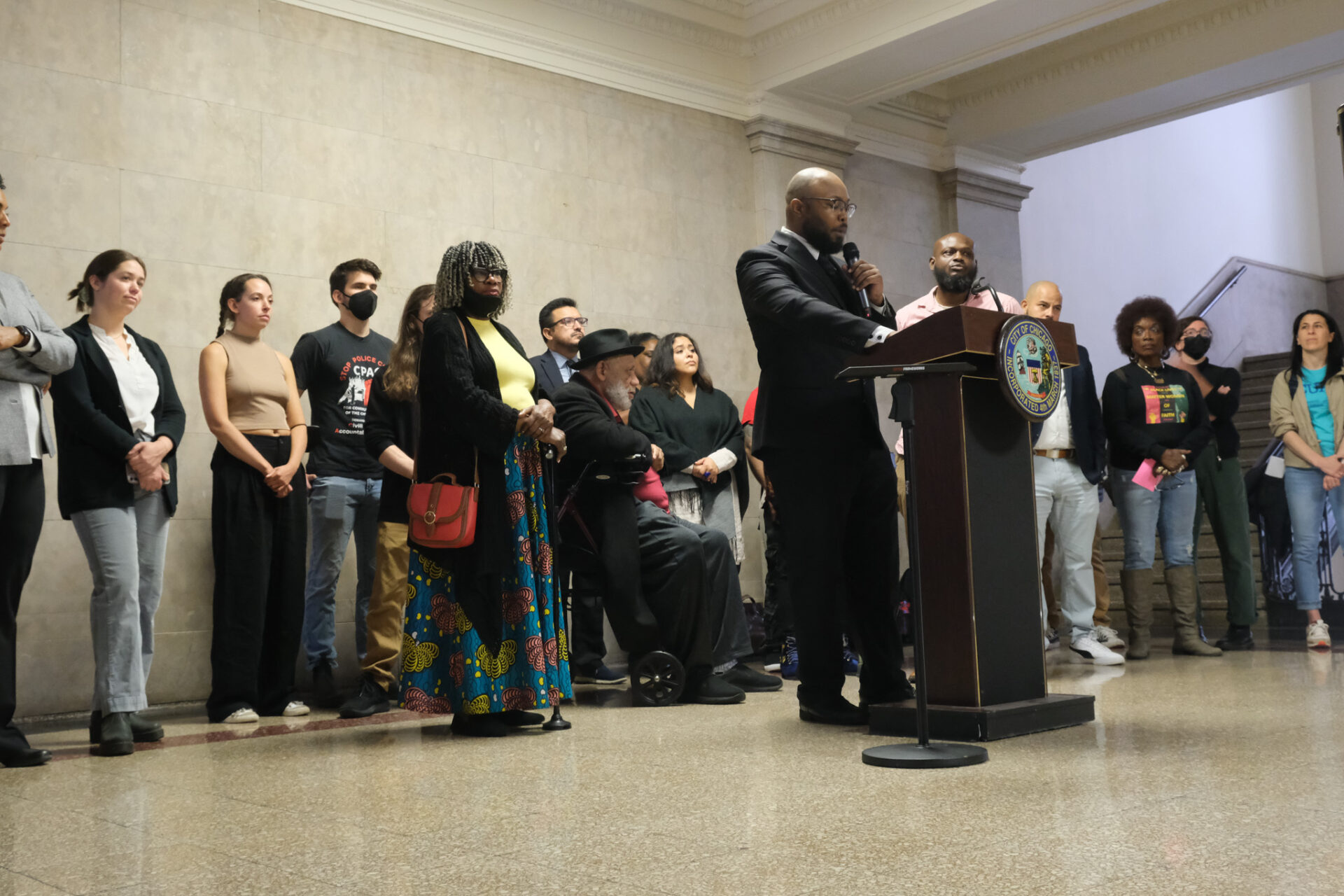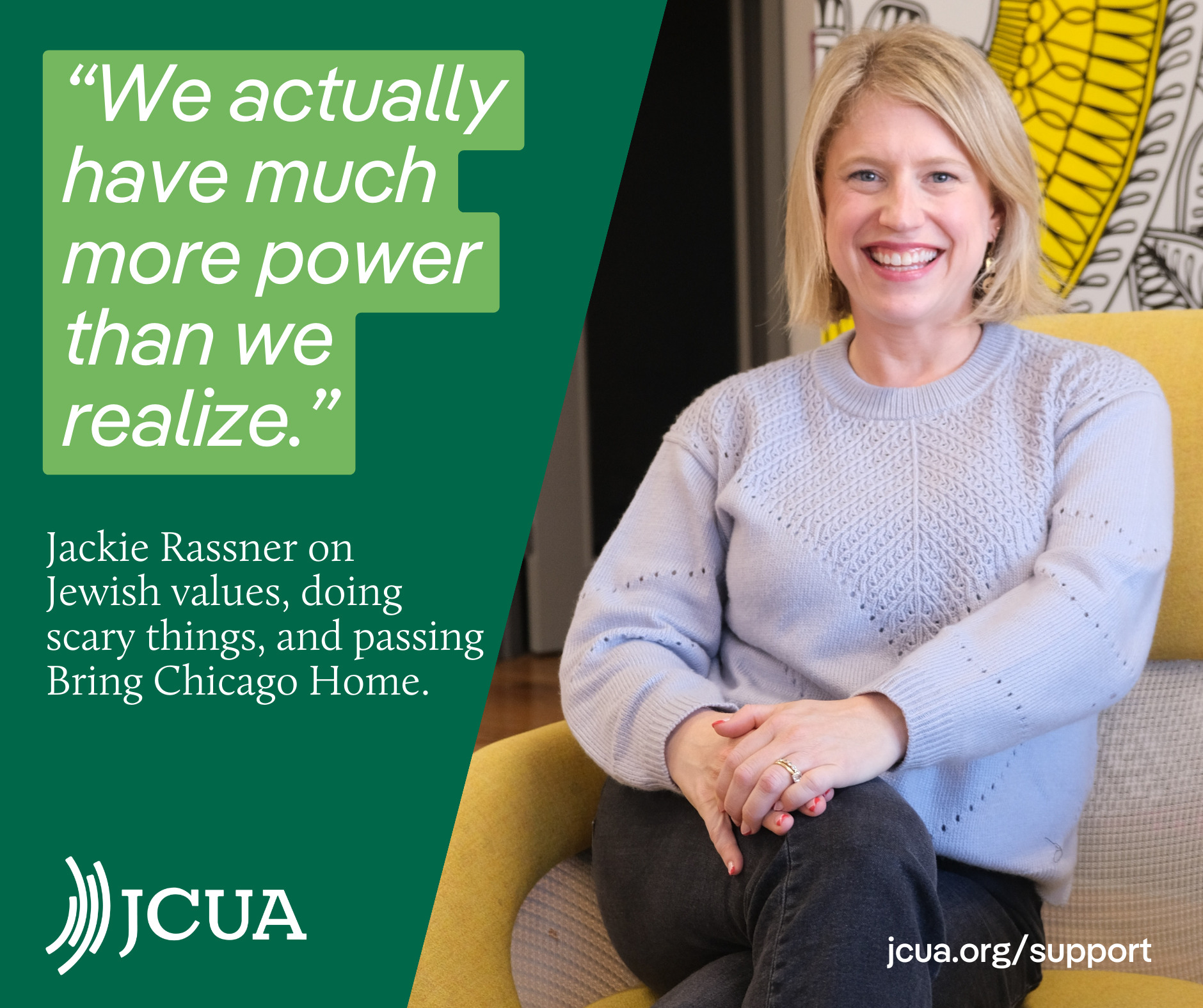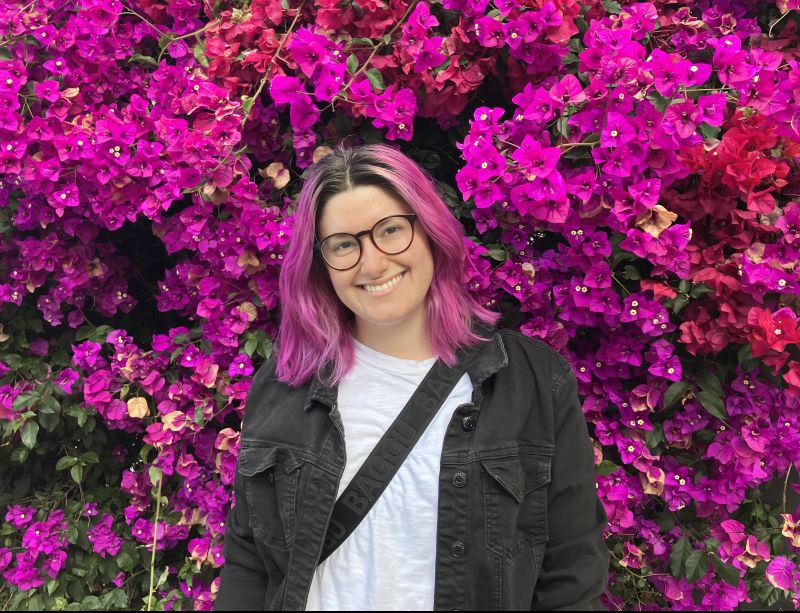Robert Peters: “We must have trust, not only in others, but in ourselves”
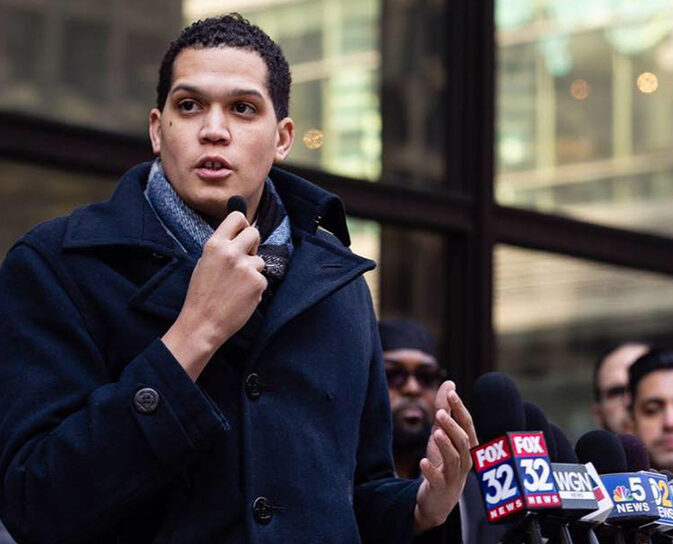
For our end-of-year campaign, we spoke with Illinois Senator Robert Peters about his perspective on social justice and community safety, and his involvement with JCUA and the Kol Or Jews of Color Caucus. Please support JCUA’s work to build a brighter, safer future for all by making an end-of-year contribution!
What do you see as the connection and intersection between social justice and your Jewish identity?
That’s such a big question, but I think it’s one of the core parts of my Judaism. When I converted to Judaism, part of what drew me was that to be Jewish is to be driven by social justice. That was very moving. To me, being Jewish is to be driven to make the world a better place, which some people think of as tikkun olam. I am both black and Jewish, and oftentimes, if not most of the time, the world has not been a place that says that you have the right to belong. But instead of becoming reactionary, to me, to be Jewish is to see yourself as fighting back and saying, “No, whether it’s myself or my neighbor, we all have the right to belong. We all have the right to treat each other well. We all have the right to live a full and dignified life.” So, I can’t see any separation from my Jewish identity, nor my black identity in my work for social justice.
How do you understand community safety, and how has that informed your work to end cash bail and pursue criminal justice reform in Chicago and Illinois?
I think that people tend to overcomplicate the idea of community safety. I would say that violence is really complex, but safety is simple. What I mean is that when you provide people with good housing, you provide people with good jobs, you provide people with an ability to get from place to place relatively easily, you provide people with pride in who they are and where we live — and when people and communities feel like they have a shared sense of power — you are more likely than not to have a safe community, a safe place. Getting people to see that reality is where it becomes complex. Our constant battle is convincing people to get out of a place of pessimism or nihilism about whether this is even possible. The complexity is not in what it means to have safety, but what it takes to get there. And it really is up to people.
Our work to end cash bail was rooted in safety. The cash bail system itself is based off wealth. It has nothing to do with safety. Having a system based off wealth means you’re taking money away from people who may need it for housing, who may need it for transportation, who may need it for their childcare or healthcare. Instead of having money that goes to those things that will provide safety, it is going to the county or the city or the court system. It wasn’t actually based off of people’s safety — it was just a form of a regressive taxation. What that resulted in is that people who could be a legitimate threat to people could pay themselves out, while people who may not be a threat had to sit in jail. It was actually a thoroughly unsafe cash bail, an unsafe system.
Moving away from that moves us closer to the goal of providing community safety for all. People’s ability to move on this issue can be complex. It involves getting people to sit back and take time to realize that the status quo they were pushing for had nothing to do with their own wellbeing and was really just about discriminating against poor people, particularly poor Black and brown people, and often poor Black and brown women.
We had been sticking to this status quo for decades, yet it hasn’t produced the results we want. So why are people doubling down on it? Why don’t we look at other places, both here and abroad, and say, what can we do to bring in different tactics for creating safety, as well as airing different views and understandings about our issues here in Chicago, Cook County, and Illinois? How can we get out of our little sort of protective shell and explore these questions and ideas?
I believe that it’s fully possible for us to bring safety to everybody. I think that is something that we can definitely do. I’m often reminded of there are a lot of people who said we could not end chattel slavery, and we did. Now it involved a lot of pain and bloodshed to get there, but we did it. We are fully capable, during periods of immense trauma and immense pain, to find the peace and safety that we all deserve, to find the changes that we need to make to make the world a better place.
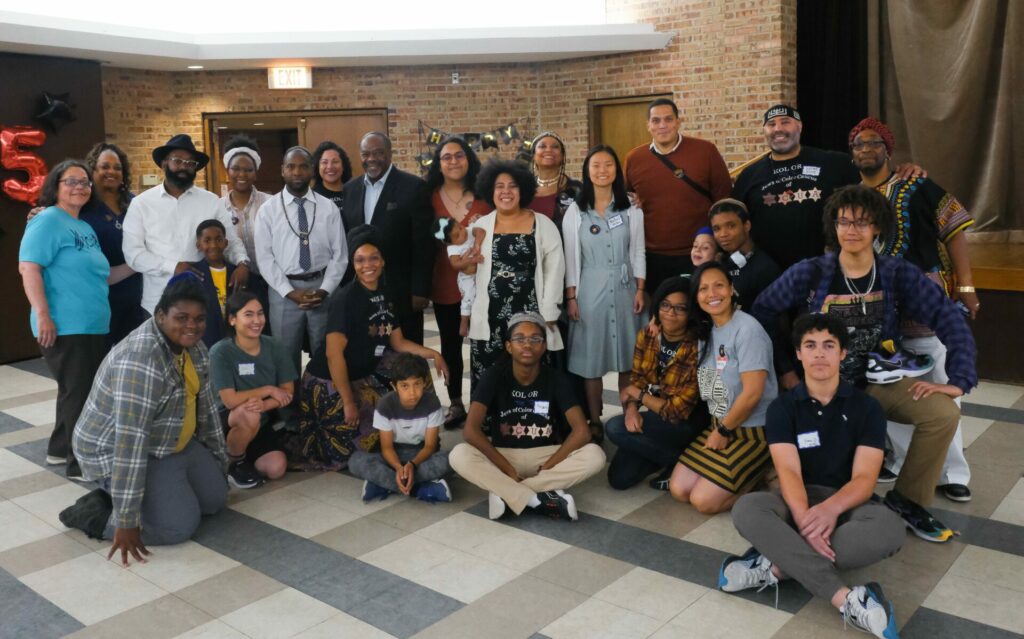
How do you apply this understanding of safety in the work against antisemitism, Islamophobia, and other forms of hate?
The first thing we need is to get people to a place where they can open up and build relationships with each other. Sometimes those are direct interpersonal relationships, or just a broader sense of community relationships. I don’t think that we’ll ever completely eradicate reactionary forces, right? I don’t think we we’ll have a progressive force, and only that progressive force. I think reaction will be a struggle we always have to deal with. But in order for us to limit the monster that is reactionary forces, we need to develop a sense of relationship with each other, both on a local scale, and of course, on a broader global scale.
To develop those relationships, people must have trust, not only in others, but in themselves, which is similar dynamic to the work to create community safety. It’s getting people to first plant the seeds and water the pot of political imagination, and to know that we play a collective role in growing our political imagination. We need to provide and feed; you need good soil, and to know that the core foundation is that we’re all in this pot together, we’re all working in the same ecosystem.
We must both expand our political imagination get people to understand that we are all in this together, and we have to be resilient against the more reactionary forces that try to tear us down. This is a way for us to push back against antisemitism, Islamophobia, transphobia, and white supremacy more broadly. I don’t think that’s something that just happens overnight, but I think that it will comes if we all do this work, struggle together, that we all take time and step back and take a deep breath and don’t overly react when things happen. I think that we can, in fact, get there.
If I believe that safety is everybody being able to have good school, everybody being able to have good housing to be able to get from point to point relatively safely and easily, then it’s also about saying things like segregation need to be torn down. We can’t live completely cut off from each other where we feel we can suppress one group of people over another and hold them up. We have to tear down the walls of segregation and understand that we need to live together and struggle together to get there.
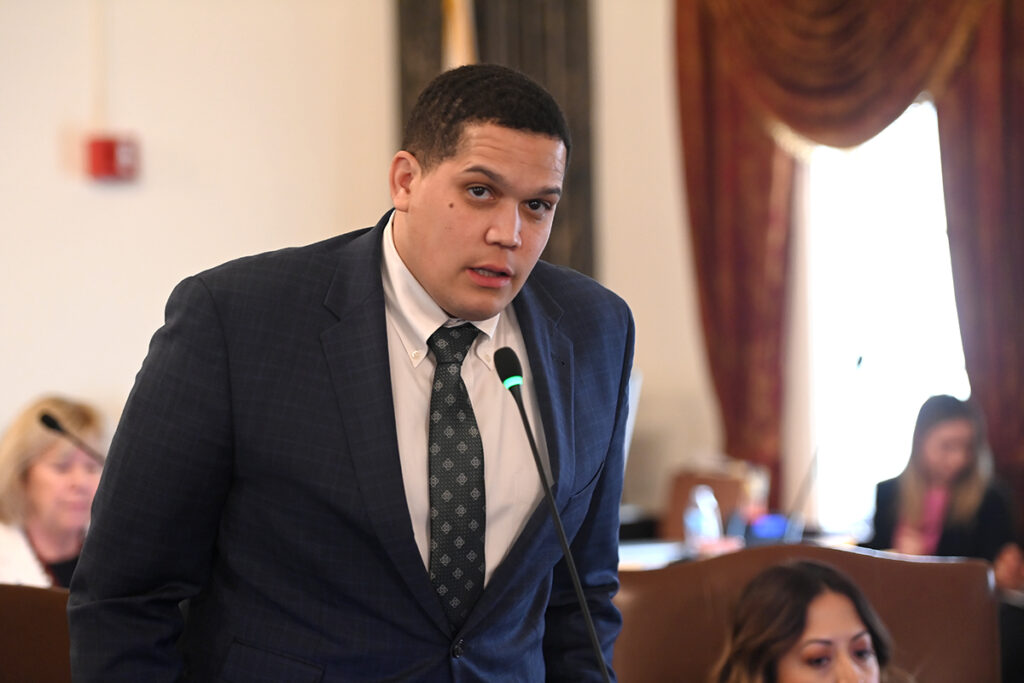
Have there been experiences with JCUA that have stuck out in your mind as meaningful?
I think the intentionality of Kol Or has been so important. As I was in this journey of finding out who I was as a person, having that space was just a life changer. Kol Or helped give me an understanding and a sense of belonging. It made me wrestle with the complexity of being Jewish and a Jewish person of color. At the Juneteenth Havdalah this summer, the best way I can put it is that it was an extremely black service. Being there, I was like, “oh, this is my home.” That to me was something that really stuck out.
I think the commitment of JCUA around being open to the diversity and complexity of Jewishness it’s why you do very important and special work. Jews of Color are obviously not a monolith, right? That in itself is complex, right? I am a Jew of Color, but I converted due to a variety of circumstances, and I’m Black and a Jewish person of color, but there are folks who are Mizrahi Jews of color, right? I think that complexity is always important to be grounded in. The only way we’re ever going to be able to understand the complexities of our Jewish experiences is really through listening, through conversation, through relationship building.
That is why it’s important for Jewish institutions to make sure to center these experiences, not just out of a basis of guilt, but from a true place of understanding that the complexity of being Jewish is what makes Judaism special in itself. And this will also only help us get to that goal of, for example, desegregating spaces, providing clear community safety for everybody. And to know, I think it’s very important that if you’re particularly white and Jewish, so, you know, especially Ashkenazi Jewish in America, that we often, people often talk about the idea of not feeling a sense of home or belonging. Well, that feels sometimes doubly or triply true if you’re a Jew of color. In fact, instead of seeing that experience as something that’s separate, actually seeing those experiences tied together only help us understand what we’re fighting for in terms of creating a space that has equality and fairness and dignity built into it.
Why do you think JCUA’s work to mobilize the Jewish communities of Chicago and Illinois to pursue justice is important?
JCUA is a place where we do not operate from a space of reaction. JCUA is constantly pushing for the sense of dignity in people’s lives and does it from a place of love. It is, for me, a community to be a part of as we do this broader social justice work. I’ve been particularly thinking about this recently, that when there’s crises, you have to think about where’s home, where do you feel safe, and where do you feel connection? I think that’s what makes JCUA special, because it provides people with that home. It provides people with that sense of safety, and it sees itself as connected, not just to the Jews of Chicago and Illinois, but to communities across the city and state, and it is constantly pushing to build and strengthen those connections.


